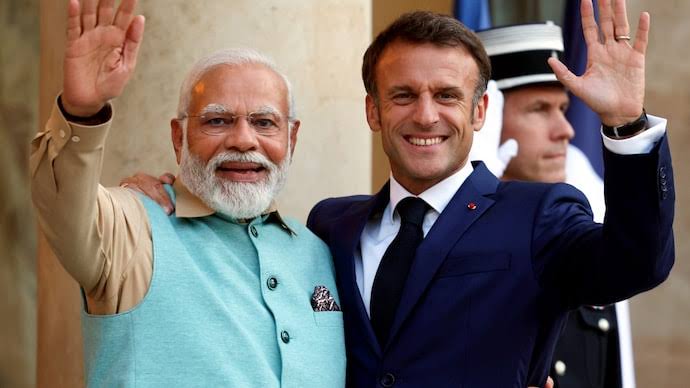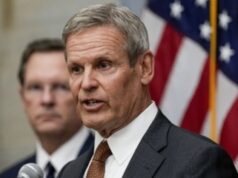Report and Analysis of PM Modi’s Visit to France-13-14th July, 2023

By Mr Ajit Kumar, IFS (Retd)
Formerly Permanent Representative to UN (Geneva)
Overview:
At the invitation of President Macron, PM Modi concluded a historic visit as the Guest of Honour of the National Day of the French Republic on the occasion of the 25th anniversary of the India-France Strategic Partnership. In January 1998, in a world of change and uncertainty, PM Atal Bihari Vajpayee and President Jacques Chirac elevated the relationship to a Strategic Partnership – one of the first for India with any country.
Responding to President Macron’s video offering a glimpse of PM Modi’s visit to France, PM Modi noted that the bond between India and France transcends time and resonate with their shared principles. It was a proud moment to see PM Modi introducing President Macron to the Commander of tri-services Indian Armed Forces contingent, which participated in the Bastille Day parade. 3 Rafale jets of Indian Air Force also participated in the flypast.
The French President welcoming India as a Guest of Honour, hailed the country as “a giant in world history, with her decisive role to play in future, a strategic partner, a friend”. PM Modi responded that “1.4 billion Indians will always be grateful to France for being a strong and trusted partner”.
History was again made when PM Modi was hosted by President Macron for dinner at the Louvre, the world’s most famous museum. The last time in 1957, France hosted Queen Elizabeth there.
It was a visit, rich in symbolism and substantive outcome
Key Meetings:
On 13th July PM Modi met Ms. Elisabeth Borne, Prime Minister of France and discussed furthering cooperation in various areas such as economic and trade, energy, environment, education, mobility, railways, digital public infrastructure, museology and people to people ties. Both sides reiterated their desire to further deepen the multifaceted cooperation between India and France.
PM Modi met H.E. Mr. Gerard Larcher, President of French Senate and the discussions focused on a wide range of areas including India’s G20 priorities, democratic values in technology usage and cooperation between the two Upper Houses. Regional and global issues of mutual interest were also discussed.
PM Modi and President Macron, jointly addressed a group of leading Indian and French CEOs. The Forum consisted of CEOs from diverse sectors including aviation, manufacturing, defence, technology, energy, among others. PM acknowledged the role played by these industry leaders in strengthening bilateral relations and promoting economic cooperation between India and France. He highlighted India’s progress in renewables, start-ups, pharma, IT, digital payments and infrastructure and the various initiatives undertaken to foster business. PM encouraged the CEOs to utilize the investment opportunities in India and be a part of India’s growth story.
PM Modi also held delegation level talks with President Macron on wide range of areas of bilateral cooperation including defence and security, civil nuclear, science and technology, energy, trade and investment, space, climate action and people to people ties.
They also took stock of the transformation and expansion of the relationship, over the past 25 years, in every area of bilateral cooperation and highlighted its evolution into a partnership of regional responsibilities and global importance. Discussions also covered India’s G20 Presidency, Indo-Pacific, and regional and global issues of mutual interest. PM also conveyed that he looked forward to welcoming President Macron in New Delhi for the G20 Leaders’ Summit in September, 2023.
Outcomes:
India and France agreed on a slew of new initiatives and agreements after PM Modi and President Macron held bilateral talks. The substantive outcome may be seen in the three documents signed. “Horizon 2027”; 25th Anniversary of the Strategic Partnership between France and India: towards a Century of Indo-French Relations”. It sets the course for the France-India bilateral relationship in all areas till 2047, the year that will mark 100 years of India’s Independence, 100 years of diplomatic relations between our two countries, and 50 years of the Indo-French strategic partnership.
“A Joint Communique on the visit of PM Modi to France” and “List of Specific Outcomes”; PM’s visit to France”, were the other two, which were also adopted. A India-France, Indo-Pacific Roadmap was also agreed.
The bold vision for the new phase outlined by Modi and Macron in the Horizon 2047 roadmap for bilateral relations has three pillars: Partnership for security and sovereignty; Partnership for the planet and Partnership for the people.
In brief, the first involves consequential plans for the co-development and co-production of advanced weapons systems, including submarines and fighter jet engines, deeper engagement in space and other advanced technologies, and regional security cooperation in the Indo-Pacific. The second saw the expansion of Franco-Indian collaboration in countering climate change and developing green technologies. The third saw the decision to raise the number of Indian students in France to 30,000 by the end of this decade and give them attractive post-study work visas. France will also partner with India in building a new national museum in Delhi.
The Joint Communique mentions a large number of specific projects in the areas of renewables, circular economy, and the blue economy, which would be useful for India’s sustainable modernisation and urbanisation. France is a pioneer in civil nuclear energy and has offered to build six nuclear power reactors in Jaitapur.
Assessment:
On solid foundations laid by earlier leaders, three Indian Prime Ministers and Four French Presidents have contributed to special India-France ties in the last 25 years. PM Modi had played a historic role in finalizing the Rafale deal and forcefully articulating the Indo-Pacific narrative, which has made a qualitative difference. Modi-Macron bonhomie has the potential to make it a defining partnership. PM Modi’s visit provided a welcome opportunity to reset 25 years of highly successful strategic partnership.
PM Modi’s visit to France is another investment in a bilateral relationship that is most consequential for both countries. France is one of India’s most reliable strategic partner and certainly the oldest one. The bilateral relationship is, after the one with US, the second most consequential for India.
In fact, the Franco-Indian partnership spans the full spectrum of what may be considered strategic – defence, space, climate change, critical technologies and people-to-people ties. More importantly, France has stood by India through thick and thin from the time of strategic partnership was first established in 1998, the year when we conducted our nuclear tests. France, among the major nations, did not criticise India’s nuclear tests. When the US and other countries imposed sanctions on India, France opposed it and sent its National Security Advisor to India, whom I had met and knew, as he was former Ambassador to UN in Geneva, when I was earlier posted there. So, France was the first country to recognise the strategic importance of India after the nuclear test of 1998. The partnership with France is India’s most strategic partnership in Europe. It is one of the rare partnerships that is marked by total convergence.
The defence relationship, a critical element in ties, is marked by trust and reliability. In fact, PM Modi had stated that defence ties have always been key pillar of bilateral relations between the two countries. The key agreements; Safran, the French company and the DRDO (Defence Research and Development Organisation) will jointly develop jet engines for the advanced medium combat aircraft. Again, Safran will co-develop with Hindustan Aeronautics Ltd engines for the Indian multi-role helicopter programme. Submarines and proposed to be jointly built by Mazagon Dock Shipbuilders and the Naval Group of France. Therefore, the defence ties have now moved to that of jointly designing, developing and co-producing in India. This is a paradigm shift by France (after USA) and it is willing to part with know-how and state of the art technology. Therefore, it is contributing to ‘Atmanirbhar Bharat’ and as PM Modi stated that France is a crucial partner in this respect.
Also, between 2018 and 2022, France has emerged as India’s second largest defence supplier, accounting for 29% of the country’s imports that defence footprint could increase with further defence deals. There have been debate in the media about acquisition of 26 Rafale marine aircraft for INS Vikrant, not reflected in documents. This would happen in due course as further negotiations are carried out. Foreign Secretary Kwatra put a spin stating that “The Horizon 2047 document looks at the bilateral defence and security partnership from a more holistic and comprehensive manner rather than a set of individual transactions or procurements”. This is also influenced by domestic politics so that it does not become an election issue in the forthcoming state and national elections. In the last General Elections, Rahul Gandhi had made it an election issue, though it did not help his party.
The Indo-Pacific also occupied centre stage in discussions between the two leaders and outlined in a Roadmap. The importance of France lies in the fact that France has large territories in the form of Reunion, New Caledonia and French Polynesia of 2.7 square million kms. Besides the bases in Indo-Pacific, it has a long exclusive economic zone with 1.2 million citizens living there. The roadmap already talks of cooperation being comprehensive and including the field of defence. Joint exercises between the two countries, use of French military bases by Indian forces and achieving real-time maritime domain awareness in the Indian Ocean are of paramount importance for India. The roadmap underlines besides a free and open and inclusive Indo-Pacific, the fact that Franco-Indian cooperation seek to secure not just economic but also security interests This is aimed against aggressive China. So, in the maritime space, India could count significantly on France along with India’s QUAD partners.
India and France also pledged to partner for the planet and global issues like climate change. They also agreed to cooperate on plastic pollution, health, blue economy, financing energy transition and decarbonised hydrogen. In the Horizon 2045 document, India and France were keen to promote a more inclusive and environmentally friendly development and encourage initiatives that contribute to the financial inclusion of women and vulnerable population, as in the case of projects supported by Indian funds (Annapurna, IndusInd Bank, Neogrowth) and backed by Proparco.
Both countries had jointly launched the International Solar Alliance and established trilaterals like India-France-Australia and India-France-UAE. So, a similar worldview and new economic opportunities in India have sustained the partnership in the last 25 years.
Franco-Indian cooperation on critical technologies, be it supercomputing, cloud computing, artificial intelligence and quantum technologies is crucial for India’ future and may well determine the trajectory of the relations over the next 25 years.
Both India and France value their strategic autonomy, pursue independence in their foreign policies, and seek a multipolar world, even as both acknowledge the place and importance of the US in the world order. The French views on foreign affairs, converge with the Indian preference for a multipolar world and strategic independence.
Modi and Macron enjoy great personal rapport. India did not let last week’s rioting and violence in Paris come in the way of the Indian PM’s visit. The two countries have had a tradition of not commenting on each other’s internal issues. Macron did not bring up the Manipur issue or India’s perceived backsliding on human rights and religious freedoms, the subjects of a blistering European Parliament resolution, which India rejected.
The bold vision for the new phase outlined by Modi and Macron rests on three pillars — defending security and sovereignty, deepening cooperation on global issues, and developing stronger engagement between the two peoples. A strong institutional mechanism has been established to strengthen cooperation in the areas of defence, space, civil nuclear, renewables, cyberspace, digital technology, counter-terrorism, maritime security, regular defence exercises and the blue economy.
France is the 11th largest foreign investor in India with a cumulative investment of $10.5 billion from April 2000 to December 2022. There are around 150 Indian companies operating in France. Post-Brexit, several Indian businesses wanting to shift to mainland Europe are choosing France as their foremost place. On the other hand, there are more than 1,000 French establishments present in India that have a total turnover of $20 billion and employs 300,000 people and have a minimum stock investment portfolio of $19 billion. 39 of the 40 CAC 40 companies are present in India. The bilateral trade in goods between the two stands at $13.4 billion for 2022-23 accounting for less than 1.2 per cent of India’s total trade. This remains the weak link in India-France bilateral relations. Despite vast possibilities, economic and trade cooperation remains far below its potential. France is the 5th largest trading partner for India in the EU, falling behind, Germany, Belgium, Netherlands, and Italy.
Therefore, India and France need to chart a roadmap to increase trade and investment, as well as facilitate greater collaboration among companies and diverse sector-specific engagements. Industries such as IT, automotive, renewable energy, pharma, biotech can take advantage of these opportunities. Moving forward, the relationship should evolve from strategic partnership with greater emphasis on ‘techonomic partnership’. The announcement of the use of UPI payment mechanism in France is step in that direction. In addition, the ongoing negotiations for the India-EU Free Trade Agreement (FTA) can be a win-win situation for both nations – taking further the burgeoning relations between India and EU.
The basic approach on security issues of both countries is similar and based on their perception of core national interests, national identity and strategic independence. Both prefer a multi polar world and strategic autonomy.
In a complex world with seemingly intractable Ukraine-Russia conflict, the Indo-French connect brings stability and support to India’s Presidency of the G20. France would play a supportive role in India’s bid to forge a consensus at G20 at the September Summit in New Delhi.
To sum up, special personal warmth from President Macron, the unprecedented protocol, and the ambitious strategic goals that defined PM Modi’s visit to Paris herald a new phase in India’s relations with France. India’s relationship with France is unique and multi-dimensional. It was a visit, rich in symbolism and substantive outcome is most significant by any Indian PM. PM Modi’s visit to France also delivered concrete outcomes that can pave the way for several economic and business ventures. France and India are also taking long term bets on each other, seeking to shape a multi polar world. As India builds a strong partnership with US to cope with the Chinese challenge, India is right to bet on the French connection to maintain its room for manoeuvre in the unfolding era of turbulence in great power relations. Therefore, Indo-French relations remain one of the most consequential for both the countries.



